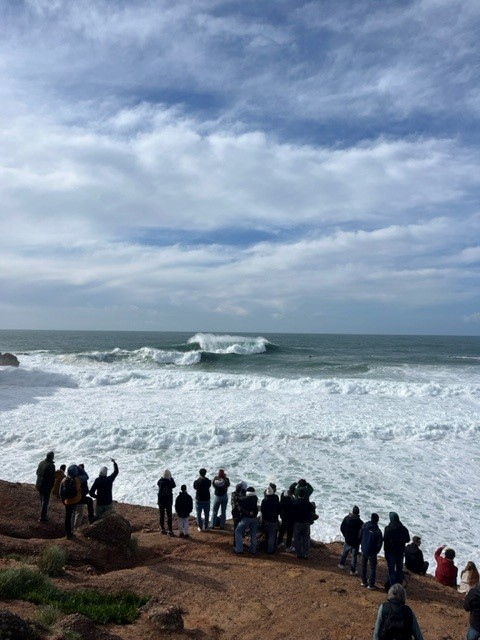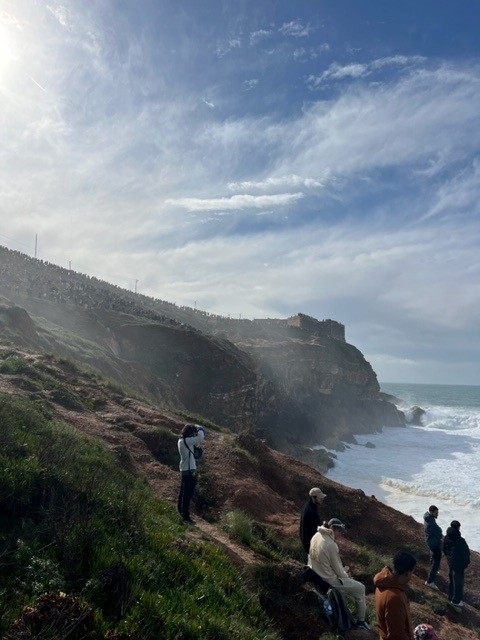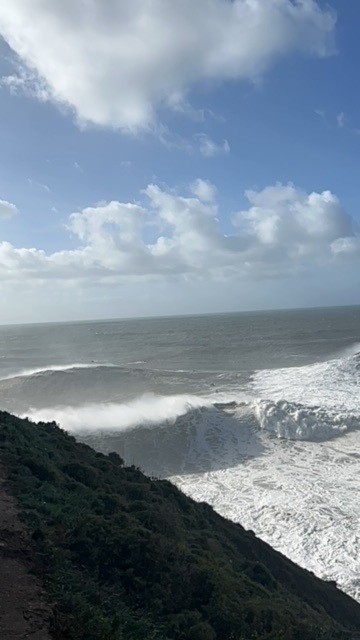Adisa: IPS – Polytechnico Setúbal – Portugal – Winter Semester 2024/25

As part of the Erasmus+ program organized by my home institution, PH-Stmk, I had the opportunity to study for winter semester 2024/25 as an exchange student at the Polytechnic Institute of Setúbal (IPS) in Portugal. My department was the Pedagogical Institute of this establishment, which also offers several other fields of study. I attended five different courses, including one in educational sciences and three historical courses related to my secondary education subjects “History, Political Education, and Social Studies,” as well as one elective course. All courses, except for the last one, were conducted in Portuguese, and although I was not proficient in the language, I encountered no significant difficulties, minimal communication issues, and had no problems completing the assignments. Most of the students spoke excellent English, which helped me navigate various translation challenges. The professors were exceptionally accommodating and dedicated to assisting me, often translating or introducing passages and discussions into English.
The structure of my chosen courses was quite similar; they comprised presentations, essays, group projects, excursions, and smaller weekly assignments, resembling our university seminars. In two of the five courses, there were also assessments, typically administered in Portuguese; however, the exam papers were translated into English for my benefit. The level of difficulty varied, but despite language barriers, the courses were manageable. I utilized translation tools (Google Docs Translator or DEEPL app, directly with my camera) to translate all reading materials and PowerPoint presentations either simultaneously during class (with the professors’ consent regarding the use of mobile devices and photographing the slides) or afterwards.
The institute operates like a typical higher education institution in Austria, with students progressing class by class and receiving pre-prepared timetables from the department. Thus, there was minimal interaction among students outside their classes, as they tended to remain within their specific group configurations. The content of the lessons was enriching and engaging in many ways, as it covered the same spectrum as our courses (education and history), but from a Portuguese perspective. This insight into their systems, lifestyles, and structures has opened a completely different viewpoint, offering me new opportunities and strategies regarding my educational path, particularly concerning class configurations and issues related to migration, diversity, and education, as well as obstacles and possible solutions within the Portuguese education system. Additionally, the cultural perspectives presented would not have emerged had I attended classes solely with Erasmus students where instruction was only in English.
I regarded it as a privilege to be surrounded almost exclusively by Portuguese peers, to engage daily with their language, to listen to it, and to experience their culture at its core, while also hearing numerous personal stories. As I was accustomed to a traditional university system of selecting courses from various classes and semesters, I ultimately found myself in four different classes, each comprising approximately thirty students. They were all very welcoming and provided support in every respect, whether with group assignments or other challenges. The Portuguese people, in general, are known for their openness and hospitality; they are quick to help and ensure that one does not feel alone in any regard. Particularly, my
fellow students with Brazilian backgrounds demonstrated compassion and understanding, extending considerable academic and personal support.
The Pedagogical Institute also features a cafeteria that serves excellent traditional cuisine in large portions for around €4–5, including some vegetarian options; however, lactose-free and gluten-free meals are challenging to find throughout Portugal. In such cases, it is advisable to bring one’s own food, as there are plenty of tables for sitting and facilities to heat up meals in microwaves. A wide selection of beverages, fruits, sweets, and traditional Portuguese “fast food” is also available. The ladies working there have a good command of English and are particularly friendly. For those seeking to escape the noise of the cafeteria and find a place to work, the institute provides balconies with outdoor seating, although these are only accessible via classrooms. Additionally, the library is a great place to work, equipped with power outlets at almost every seat and the familiar Eduroam Wi-Fi available throughout the campus.
There is a selection of English-language books in the library, which I also utilized for some essays; furthermore, the professors assisted me in finding appropriate English texts. For public transportation, there is a “Navegante” card, like our “Klimaticket,” which can be purchased for either the Setúbal region or also for Lisbon. Students under a certain age limit who possess a “NIF” (tax number obtained from the authorities) can obtain this card for FREE; those without a NIF and older than the specified age pay €40 monthly for the Lisbon region.
I resided in downtown Setúbal, approximately a 10–12-minute walk from the train station, from where it took me about three minutes by train to reach the institute, with an additional five-minute walk from the station. The bus takes significantly longer—about 30 minutes.
Depending on the institute one attends, either the train or bus may be more conveniently located, as the bus stops on the opposite side of the campus compared to the train. It is generally advisable to anticipate delays not only with these modes of transportation but across all public transit systems. The public transportation network is exceedingly well- connected, providing access to every locality, and with my “Lisbon Region Navegante Card,” I explored numerous destinations and was able to reach my surfing training location every weekend.
Throughout the winter, I surfed 2 to 3 times a week in Costa de Caparica, participating exclusively in group sessions offered by a surf school. These sessions are often available to Erasmus students at discounted rates, sold in packages of five or ten. Beyond the surfing lifestyle, Portugal, with its stunning beaches, offers countless activities for hiking and exploration, presenting nature that remains largely untouched and breathtaking, though not always easily accessible.
In Setúbal (and other Beachside towns), the culinary scene is predominantly centered around fish, particularly octopus, resulting in a plethora of restaurants that serve fresh seafood dishes. There are also several markets along the harbor where one can purchase fresh fish, fruits, vegetables, and other groceries. While dining in Portugal is somewhat cheaper than in Austria, rent tends to be comparably priced. My accommodation—a three-person shared apartment with four rooms, a kitchen, a bathroom, and a separate toilet—was listed among the properties recommended by Erasmus+, situated in the city center, yet it was in a deplorable state.
The landlord, Raphael, also owns a pub called the Crazy Dolphin, where he regularly organizes parties for Erasmus students. Unfortunately, I did not receive a rental agreement from him until several days after my arrival in Portugal, despite repeated requests. Minimal standards of a rental agreement were scarcely met. He addressed issues in the apartment superficially, was rarely reachable, and often failed to respond to numerous appeals. The apartment was plagued with severe mold throughout, lacked heating, was unsanitary from the outset, and had several hazardous conditions (such as exposed electrical sockets near the stove and inadequate ventilation in the bathroom, where mold covered the entire ceiling—without a window), which he deliberately ignored. Compared to accommodations of my fellow students, this situation was an anomaly.
My roommates and I endeavored to resolve many of these issues independently. Fortunately, my roommates were extraordinarily collaborative, and we managed to organize our responsibilities effectively, resulting in a harmonious living environment. I lived with an Austrian (whom I had not known previously, and together we were the only two Austrians at IPS) and a Brazilian couple. Altogether, they were part of the institute’s international Erasmus program, conducted entirely in English and focused on business studies. Despite our housing challenges, we made the best of our situation, developing deep friendships and maintaining close contact even after our experience.
I was also invited to celebrate Christmas at my roommate’s grandparents’ family gathering, where I enjoyed a traditional Portuguese Christmas in a small town called Mira d’Aire and experienced the warmth of the family who proudly showed me the fishing and surfing town of Nazaré, renowned for having the tallest waves in the world during the season. I visited this location an additional four times to observe the Big-Wave surfers. All these experiences not only fostered numerous friendships but also profoundly shaped my perspectives and personality in many ways. I had always believed myself to be a rather relaxed and easy-going individual compared to my Austrian friends. However, the Portuguese taught me that there are even more ways to navigate everyday “stress factors” with ease and to find joy in the process. This may also be attributed to the 300 days of sunshine each year, which contributes to the inherent cheerfulness and relaxation of the Portuguese people.



Reporter: Adisa Hadzajlic
